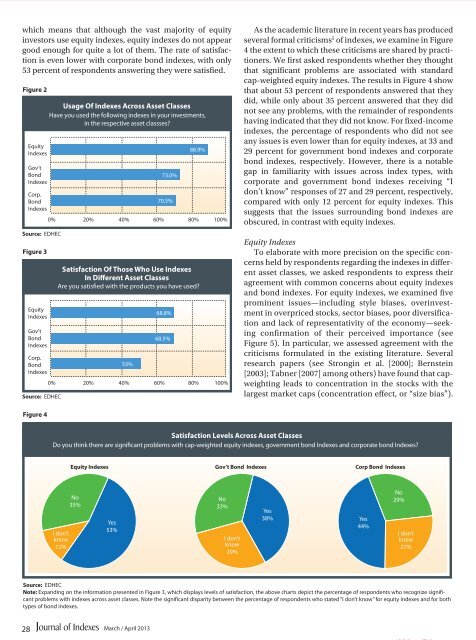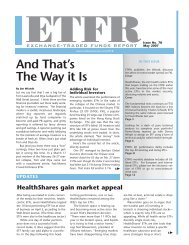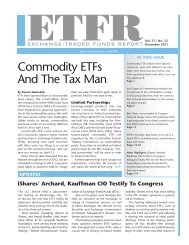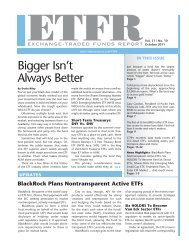Download complete issue - IndexUniverse.com
Download complete issue - IndexUniverse.com
Download complete issue - IndexUniverse.com
Create successful ePaper yourself
Turn your PDF publications into a flip-book with our unique Google optimized e-Paper software.
which means that although the vast majority of equity<br />
investors use equity indexes, equity indexes do not appear<br />
good enough for quite a lot of them. The rate of satisfaction<br />
is even lower with corporate bond indexes, with only<br />
53 percent of respondents answering they were satisfied.<br />
Figure 2<br />
Equity<br />
Indexes<br />
Gov’t<br />
Bond<br />
Indexes<br />
Corp.<br />
Bond<br />
Indexes<br />
Source: EDHEC<br />
Figure 3<br />
Equity<br />
Indexes<br />
Gov’t<br />
Bond<br />
Indexes<br />
Corp.<br />
Bond<br />
Indexes<br />
Source: EDHEC<br />
Usage Of Indexes Across Asset Classes<br />
Have you used the following indexes in your investments,<br />
in the respective asset classses?<br />
73.0%<br />
70.5%<br />
88.9%<br />
0% 20% 40% 60% 80% 100%<br />
Satisfaction Of Those Who Use Indexes<br />
In Diferent Asset Classes<br />
Are you satisfed with the products you have used?<br />
53%<br />
68.8%<br />
68.5%<br />
0% 20% 40% 60% 80% 100%<br />
As the academic literature in recent years has produced<br />
several formal criticisms 5 of indexes, we examine in Figure<br />
4 the extent to which these criticisms are shared by practitioners.<br />
We first asked respondents whether they thought<br />
that significant problems are associated with standard<br />
cap-weighted equity indexes. The results in Figure 4 show<br />
that about 53 percent of respondents answered that they<br />
did, while only about 35 percent answered that they did<br />
not see any problems, with the remainder of respondents<br />
having indicated that they did not know. For fixed-in<strong>com</strong>e<br />
indexes, the percentage of respondents who did not see<br />
any <strong>issue</strong>s is even lower than for equity indexes, at 33 and<br />
29 percent for government bond indexes and corporate<br />
bond indexes, respectively. However, there is a notable<br />
gap in familiarity with <strong>issue</strong>s across index types, with<br />
corporate and government bond indexes receiving “I<br />
don’t know” responses of 27 and 29 percent, respectively,<br />
<strong>com</strong>pared with only 12 percent for equity indexes. This<br />
suggests that the <strong>issue</strong>s surrounding bond indexes are<br />
obscured, in contrast with equity indexes.<br />
Equity Indexes<br />
To elaborate with more precision on the specific concerns<br />
held by respondents regarding the indexes in different<br />
asset classes, we asked respondents to express their<br />
agreement with <strong>com</strong>mon concerns about equity indexes<br />
and bond indexes. For equity indexes, we examined five<br />
prominent <strong>issue</strong>s—including style biases, overinvestment<br />
in overpriced stocks, sector biases, poor diversification<br />
and lack of representativity of the economy—seeking<br />
confirmation of their perceived importance (see<br />
Figure 5). In particular, we assessed agreement with the<br />
criticisms formulated in the existing literature. Several<br />
research papers (see Strongin et al. [2000]; Bernstein<br />
[2003]; Tabner [2007] among others) have found that capweighting<br />
leads to concentration in the stocks with the<br />
largest market caps (concentration effect, or “size bias”).<br />
Figure 4<br />
Satisfaction Levels Across Asset Classes<br />
Do you think there are signifcant problems with cap-weighted equity indexes, government bond Indexes and corporate bond Indexes?<br />
Equity Indexes Gov’t Bond Indexes Corp Bond Indexes<br />
I don’t<br />
know<br />
12%<br />
No<br />
35%<br />
Yes<br />
53%<br />
No<br />
33%<br />
I don’t<br />
know<br />
29%<br />
Yes<br />
38%<br />
Yes<br />
44%<br />
No<br />
29%<br />
I don’t<br />
know<br />
27%<br />
Source: EDHEC<br />
Note: Expanding on the information presented in Figure 3, which displays levels of satisfaction, the above charts depict the percentage of respondents who recognize significant<br />
problems with indexes across asset classes. Note the significant disparity between the percentage of respondents who stated “I don’t know” for equity indexes and for both<br />
types of bond indexes.<br />
28<br />
March / April 2013
















